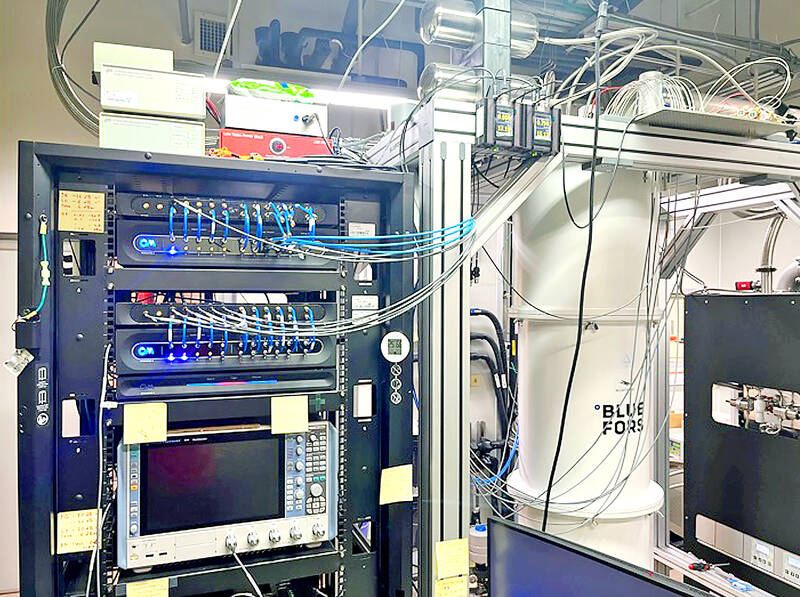Taiwan aims to produce its first domestically developed quantum computer by 2027, the National Science and Technology Council (NSTC) said yesterday.
Quantum computing is the most anticipated next-stage development for raw computational power, said Luo Meng-fan (羅夢凡), head of the NSTC’s Department of Natural Sciences and Sustainable Development.
The council has been working with the Ministry of Economic Affairs, Academia Sinica and other research organizations to realize a five-year, NT$8 billion (US$258.86 million) quantum technology plan that began in 2022, it said.

Photo courtesy of Chen Chi-tung, Institute of Physics, Academia Sinica
A Google study published in July last year showed how a random circuit sampling task that would have taken a classical supercomputer 47 years to complete was finished in just 6.18 seconds on the latest version of its Sycamore processor, which had been boosted to 70 quantum bit (qubits), Luo said.
In quantum computing, a random circuit sample task tests quantum computer performance by running random circuits and evaluating its capabilities and efficiency in solving complex problems.
With such powerful computational capabilities, security experts have warned that one day — dubbed “Q Day” — quantum computers would be able to crack codes protecting digital data, Luo said.
Measures to counter such development include quantum cryptography, such as quantum key distribution, he said.
However, quantum computers are still affected by high error rates, he said, adding that the technology needs another six years of research and development to reach maturity, when it could make a global impact.
That is why it is crucial for Taiwan to develop quantum computers to retain a foothold in critical technologies, he said.
The NSTC’s collaboration with academia and other sectors would flesh out the component supply chain for building quantum computers and shorten the time necessary when transitioning the supply chain for commercial purposes, Luo said.
Taiwan is not alone in rushing to develop quantum computers, he said.
Taiwanese researchers are in talks with Finnish quantum computing hardware company IQM to establish testing platforms in Taiwan, he said.
Four cloud software computational platforms are utilizing the quantum cloud computation services offered by IBM, Amazon and other international companies, he added.
Academia Sinica is to provide some of its newly developed 5-qubit chips for trials at research facilities later this month, said Lee Chau-hwang (李超煌), executive secretary of the institute’s Central Academic Advisory Committee.
Taiwan has only started developing quantum chipsets, but is closely monitoring increasing chipset yield rates, Lee said.
“Yield rates are key for mass production,” he said.

Chinese Nationalist Party (KMT) Chairman Eric Chu (朱立倫), spokeswoman Yang Chih-yu (楊智伃) and Legislator Hsieh Lung-chieh (謝龍介) would be summoned by police for questioning for leading an illegal assembly on Thursday evening last week, Minister of the Interior Liu Shyh-fang (劉世芳) said today. The three KMT officials led an assembly outside the Taipei City Prosecutors’ Office, a restricted area where public assembly is not allowed, protesting the questioning of several KMT staff and searches of KMT headquarters and offices in a recall petition forgery case. Chu, Yang and Hsieh are all suspected of contravening the Assembly and Parade Act (集會遊行法) by holding

PRAISE: Japanese visitor Takashi Kubota said the Taiwanese temple architecture images showcased in the AI Art Gallery were the most impressive displays he saw Taiwan does not have an official pavilion at the World Expo in Osaka, Japan, because of its diplomatic predicament, but the government-backed Tech World pavilion is drawing interest with its unique recreations of works by Taiwanese artists. The pavilion features an artificial intelligence (AI)-based art gallery showcasing works of famous Taiwanese artists from the Japanese colonial period using innovative technologies. Among its main simulated displays are Eastern gouache paintings by Chen Chin (陳進), Lin Yu-shan (林玉山) and Kuo Hsueh-hu (郭雪湖), who were the three young Taiwanese painters selected for the East Asian Painting exhibition in 1927. Gouache is a water-based

Taiwan would welcome the return of Honduras as a diplomatic ally if its next president decides to make such a move, Minister of Foreign Affairs Lin Chia-lung (林佳龍) said yesterday. “Of course, we would welcome Honduras if they want to restore diplomatic ties with Taiwan after their elections,” Lin said at a meeting of the legislature’s Foreign Affairs and National Defense Committee, when asked to comment on statements made by two of the three Honduran presidential candidates during the presidential campaign in the Central American country. Taiwan is paying close attention to the region as a whole in the wake of a

OFF-TARGET: More than 30,000 participants were expected to take part in the Games next month, but only 6,550 foreign and 19,400 Taiwanese athletes have registered Taipei city councilors yesterday blasted the organizers of next month’s World Masters Games over sudden timetable and venue changes, which they said have caused thousands of participants to back out of the international sporting event, among other organizational issues. They also cited visa delays and political interference by China as reasons many foreign athletes are requesting refunds for the event, to be held from May 17 to 30. Jointly organized by the Taipei and New Taipei City governments, the games have been rocked by numerous controversies since preparations began in 2020. Taipei City Councilor Lin Yen-feng (林延鳳) said yesterday that new measures by